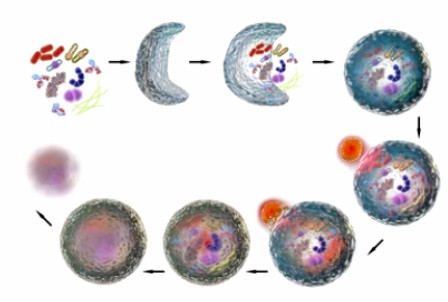Detection of Autophagy in Plant Cells
Autophagy is a highly conserved intracellular degradation and turnover pathway formed by the long-term evolution of eukaryotic organisms, in which autophagosomes forming a double-membrane structure transport macromolecules to be degraded, such as damaged proteins, protein complexes, and cellular organelles, to vesicles or lysosomes to be degraded and to produce recyclable degradation products. Cellular autophagy plays a vital role in plant growth and development and environmental response. More than 40 autophagy genes have been identified in model plants such as Arabidopsis and rice, and many of these genes are significantly up-regulated during developmental stages such as leaf senescence and seed maturation, as well as in response to adversities such as nutrient starvation, drought, and pathogen infestation, etc. The specific mechanisms of activation and repression of autophagy remain to be elucidated. However, the specific transcriptional activation or repression mechanism remains to be elucidated.
Lifeasible can provide researchers with plant cell autophagy detection services based on our technology and testing platform. We often use transmission electron microscopy, MDC staining, and fluorescent protein labeling to detect autophagy in plant cells. The autophagy service we provide has been used in various plant autophagy studies.

What do we offer?
- Transmission electron microscopy to observe the formation of autophagosomes. Transmission electron microscopy (TEM) is used to detect autophagic structures because of its high resolution. Compared to biochemical assays as well as other methods, TEM is the only method that can display the morphology of autophagic structures on the nanoscale and can be used to elucidate the morphology of autophagic intermediates and autophagic substrates, and TEM is the gold standard in autophagosome observation.
- MDC (Monodansylcadaverine) staining method. MDC is one of the most used fluorescent probes for cellular autophagy detection, and it can be used to specifically label the autophagosome, also known as autophagic vacuole, by ion trapping and specific binding to membrane lipids, and is therefore commonly used in the detection of cellular autophagy. MDC is an eosinophilic fluorescent probe, and many acidic membrane structures are also stained by MDC, so normal cells will also have a certain staining background when stained by MDC. Therefore, MDC is often used as a specific labeling stain for detecting autophagosome formation, and its detection excitation filter has a wavelength of 355 nm, and the blocking filter has a wavelength of 512 nm. Cellular Autophagy Staining Assay Kit (MDC Method) for autophagy staining of cultured cells, also known as MDC Staining Solution, can be combined with EB for double staining.
- Fluorescent protein labeling assay. By fusing fluorescent proteins with autophagy-related proteins, the process of autophagy in plant cells can be monitored and quantitatively analyzed in real-time. After we selected fluorescent protein labeling, we fused fluorescent protein genes with autophagy-related genes by constructing expression vectors to generate expression vectors, which can be effectively used for the study of autophagy in plant cells by introducing the expression vectors into plant cells using Agrobacterium-mediated method and then observing the autophagy under fluorescence microscope after inducing autophagy under the culture of certain conditions.
Our service processes
- Customers place orders online
- Confirmation of order/experiment materials
- Cell culture
- Autophagy detection (including TEM assay, customized assay, etc.)
- Analysis of results
- Issuance of experiment report
- Delivery of results
Experiment delivery content
- Raw data of all experiments (including experimental process, experimental reagents, equipment, etc.).
- Identification report and result analysis (TEM photo, fluorescence map, protein electrophoresis map, etc.).
- Specific experimental report.
Advantages of our services

Lifeasible has rich research experience in plant cell autophagy detection. We always follow the development direction of advanced technology and select the most suitable assay according to the experimental materials and customer needs, which can realize the detection of plant cell autophagy efficiently and accurately. In addition, we also provide other plant cell function research and other services to meet your different needs. If you are interested in us, please feel free to contact us.
For research or industrial raw materials, not for personal medical use!

